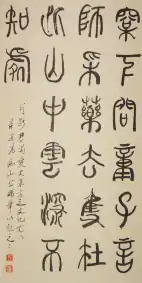
賈島
松下問童子
言師採藥去
只在此山中
雲深不知處
Seeking the Master but not Meeting by Jia Dao
Beneath a pine I asked a little child. / He said the Master went to gather herbs. / Alone was he upon this mountainside, / The clouds so deep he knew not where he was.
Jia Dao (traditional Chinese: 賈島; simplified Chinese: 贾岛; pinyin: Jiǎ Dǎo; Wade–Giles: Chia Tao) (779–843), courtesy name Langxian (浪仙), was a Chinese Buddhist monk and poet active during the Tang dynasty.
Biography
Jia Dao was born near modern Beijing; after a period as a Buddhist monk, he went to Chang'an. He became one of Han Yu's disciples, but failed the jinshi exam several times. He wrote both discursive gushi and lyric jintishi. His works were criticised as "thin" by Su Shi, and some other commentators have considered them limited and artificial.[1]
According to Dr. James J.Y. Liu (1926–1986), a professor of Chinese and comparative literature, Jia's poem "The Swordsman" (劍客) "seems...to sum up the spirit of knight errantry in four lines."[2][3] "The Swordsman" reads in Liu's translation as follows:
A metric translation of the original Chinese poem with one iamb per Chinese character[5] reads as follows:
A decade long I honed a single sword,
Its steel-cold blade still yet to test its song.
Today I hold it out to you, my lord,
and ask: "Who seeks deliverance from a wrong?"
See also
References
- ↑ Renditions Magazine
- 1 2 Liu, James J.Y. The Chinese Knight Errant. London: Routledge and Kegan Paul, 1967 (ISBN 0-2264-8688-5)
- ↑ MEMORIAL RESOLUTION Archived 2007-06-09 at the Wayback Machine
- ↑ Extremely sharp.
- ↑ Tian Min, 2020. Medium article.
Sources
Pine, Red, and Mike O'Connor. The clouds should know me by now: Buddhist poet monks of China. Boston: Wisdom Publications, 1999. Includes selection of dual-language poems.
External links
- Works by Jia Dao at LibriVox (public domain audiobooks)

- Books of the Quan Tangshi that include collected poems of Jia Dao at the Chinese Text Project: